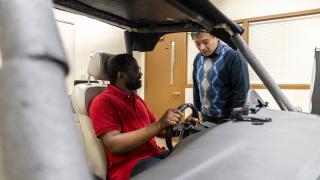
Assistant Director of Web Strategy and Services John Powell is an expert at blending form and function.
He has advanced smart-home features in his century old Victorian. And when Powell, a classically trained musician, organizes website information, he filters code and content through a performance lens. “Finding that balance between the needs of the institution and user is similar to a performer interpreting a composer’s music and making it ‘sing’ to the audience,” he says.
The two-time U-M graduate — he has a bachelor of music in organ performance and a graduate degree in library science — has worked in website implementation and strategy for 30-plus years. Powell, who started at UM-Dearborn in March, previously served as the lead content architect for Ford Motor Company’s eCommerce web experience and worked as the director of web communications at the University of Windsor, among other roles.
At UM-Dearborn, Powell leads Zoom sessions about website best practices, conducts in-person training for UM-Dearborn content ambassadors, analyzes how pages are organized, and works to discover the right balance of creativity and user friendliness.
Get to know Powell, the thoughtful artist who’s working behind the scenes on umdearborn.edu.
Powell’s web-focused career path was first featured during the mid-1990s – in The New York Times
As a U-M musical performance undergrad, Powell worked at the Music Library Information Services Desk. With encouragement from a library staff mentor, Powell decided to pursue library science and completed his Master of Library and Information Science at the university in 1995. After receiving his graduate degree, Powell created and maintained a web-based legal database for the State Appellate Defender Office in Detroit, where he also conducted internet training seminars for defense lawyers throughout the state. It wasn’t a traditional path — and that attracted The New York Times, which included Powell in their 1997 article “Moving from the Card Catalogue to the Internet.”
The article reads, “Mr. Powell, at the Appellate Defenders Office in Detroit, said the field's new emphasis on information technology, particularly related to computers, had changed the image of library science. No longer is it seen as the occupation of spectacled spinsters who delight in telling people to hush.”
Speaking about his career path and how The New York Times discovered him, Powell says, “In late 1996, The New York Times reached out to the U-M School of Information for graduates who pursued careers outside of libraries. At the time, web work was a newly developing field that desperately needed people with the skill to organize information and present it. My time at SADO afforded me the opportunity to learn first-hand how to structure content for people to easily retrieve and consume it. I developed their website and developed an online database of pleadings. I trained attorneys from around the state on how to use the web, quickly find the relevant information and help them do their job better — which ultimately saved taxpayer money. It was a nontraditional role for someone who went to library school.”
So how did Powell get on this out-of-the-card-catalog career path?
“While I was pursuing my MILS, I was going to school part time, working full time and held a part-time organist position at an area church. With my schedule, I needed to do research and work on my assignments outside of normal business hours. I latched onto this new thing called the ‘world wide web.’ I realized my career path wasn’t to work in a traditional library setting — it was to help build and organize information for people like me,” he says.
Powell continues to see the magic in technology and the real-time information access it provides.
Powell said he’s always been fascinated by technology and gadgets, starting with a Polaroid camera he received as a child from his grandfather. And that interest keeps growing.
“You could take a picture, wave it in the air for a minute and see the image right away. By the way, I still have those pictures organized by year in albums and electronically,” he says. “I guess that’s my library side shining.”
Powell continues to enjoy technology and the enhancements that it’s brought into 21st-century lives. “For myself, I look at all the things I can do from the palm of my hand — from controlling my smart house to banking to reading the newspaper to running the vacuum. It’s about saving time, convenience and access,” he says.
He enjoys connecting with people (and pets) IRL too.
Powell says at the end of the day you can find him relaxing — and somewhat unplugged — on the front porch with his husband and their 2-year-old pup Peek-a-Boo, a shih tzu and bichon frisé mix.



